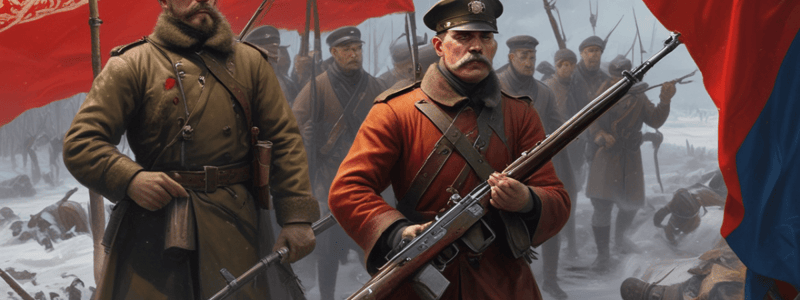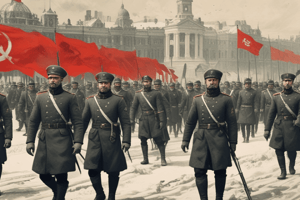Podcast
Questions and Answers
Who were the main groups involved in the Russian Civil War?
Who were the main groups involved in the Russian Civil War?
The main groups were the Red Army (Bolsheviks), the White Army (nationalists and monarchists), and the Green Army (peasants).
What were the key reasons for the Russian Civil War?
What were the key reasons for the Russian Civil War?
The key reasons were the collapse of the Russian Empire due to nationalities seeking independence, political opposition towards the Bolsheviks, and the undemocratic seizure of power.
When did the Russian Civil War take place?
When did the Russian Civil War take place?
The Russian Civil War took place from 1918 to 1921.
Who won the Russian Civil War?
Who won the Russian Civil War?
Which countries supported the White Army in the Russian Civil War?
Which countries supported the White Army in the Russian Civil War?
Why were the Whites portrayed as the invading army during the Russian Civil War?
Why were the Whites portrayed as the invading army during the Russian Civil War?
What was a major issue faced by the Whites due to a lack of a single leader?
What was a major issue faced by the Whites due to a lack of a single leader?
What was a consequence of the Whites not being united by a single goal during the civil war?
What was a consequence of the Whites not being united by a single goal during the civil war?
How did the policy of War Communism impact the economy of Russia?
How did the policy of War Communism impact the economy of Russia?
What was a key outcome of the Bolsheviks winning the Russian Civil War?
What was a key outcome of the Bolsheviks winning the Russian Civil War?
What were the consequences of the Russian Civil War on international relations?
What were the consequences of the Russian Civil War on international relations?
Who fought against the Bolsheviks in the Russian Civil War?
Who fought against the Bolsheviks in the Russian Civil War?
What were the key events of the Russian Civil War?
What were the key events of the Russian Civil War?
Why did the Bolsheviks win the Russian Civil War?
Why did the Bolsheviks win the Russian Civil War?
Who led the Green Army in the Russian Civil War?
Who led the Green Army in the Russian Civil War?
Flashcards are hidden until you start studying
Study Notes
War Communism and the Russian Civil War
- Lenin's economic policy of War Communism controlled food production and manufacturing to supply the army.
- The Russian Civil War was fought between 1918 and 1921 between communist (Red) and anti-communist (White) forces.
Reasons for the Whites' Defeat
- The Whites were reliant on foreign assistance for supplies and money, portraying them as an invading army.
- Lack of planning and unity among the Whites, with multiple leaders and goals.
- Communication and geographical distance issues hindered the Whites' efforts.
- The Whites did not control key areas of industry, population, or transport links.
- As a result, their army was smaller and less well supplied.
Consequences of the Russian Civil War
- The Bolsheviks consolidated their control over the country economically and politically.
- The policy of War Communism left the country economically ruined, with collapsed food production and manufacturing.
- Unrest led to strikes, peasant uprisings, and the Tambov and Kronstadt uprisings.
- Approximately eight million people died.
- The Bolshevik Party centralized control over the country and the party.
The Russian Civil War
- The war was triggered by opposition to the Bolsheviks from various groups, including monarchists, anti-communists, and nationalities seeking independence.
- The war was fought between the Red Army (Bolsheviks), the White Army (nationalists and monarchists), and the Green Army (peasants).
Causes of the Russian Civil War
- The Russian Empire's collapse led to nationalist movements seeking independence.
- Political opposition grew towards the Bolsheviks from various groups, including the Social Revolutionaries and the Constituent Assembly.
- The Allies opposed the Bolsheviks' withdrawal from World War I and the signing of the Treaty of Brest-Litovsk.
- Law and order broke down, leading to unrest and opposition.
- Food requisitioning by the Bolsheviks angered the peasants, leading to the formation of the Green Army.
Consequences of the Russian Civil War on International Relations
- The war increased the Soviet Union's suspicion of the capitalist West.
- Lenin pursued a policy of worldwide communist revolution to protect the USSR from future foreign interference.
- This led to a 'Red Scare' in 1920s America, as many feared the spread of communism.
Key Events of the Russian Civil War
- Trotsky became the Commissar for War and took charge of the Red Army in March 1918.
- The Czech Legion rebelled against the Red Army in May 1918.
- Tsar Nicholas II and his family were executed in Yekaterinburg in July 1918.
- Trotsky increased discipline in the Red Army, shooting one in every ten soldiers who retreated.
- The Bolsheviks suffered a setback during the Eastern Front Offensive but eventually forced the Whites to retreat.
- The Red Army stopped General Yudenich's advance on Petrograd and General Denikin's advance on Moscow.
- The Bolsheviks fought a war with Poland between April and October 1920.
- The Whites were finally defeated at the Battle of Perekop in November 1920.
- The Green Army was finally defeated in the Ukraine and Tambov in 1921.
Why the Bolsheviks Won the Russian Civil War
- The Bolsheviks controlled the industrial heartlands and transport links, giving them a strategic advantage.
- They had a strong propaganda machine, using art, posters, and entertainment to spread their message.
- The Bolsheviks introduced conscription, growing their army to five million soldiers by 1921.
- Trotsky introduced harsh military discipline, recruited experienced officers, and used agitprop trains to spread propaganda.
- The Red Terror undermined opposition to the Bolsheviks, executing 50,000 enemies, including the tsar and his family.
Studying That Suits You
Use AI to generate personalized quizzes and flashcards to suit your learning preferences.




